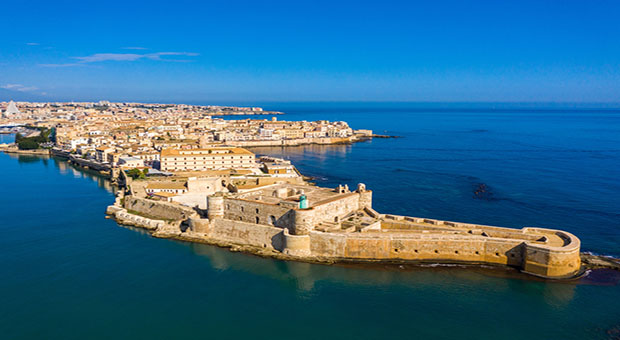Dr Jacqui Marshall reports back from the Eureka international course on translational medicine in Sicily. Insight from industry experts, the importance of patient advocates and even a spot of well-earned gelato – Jacqui gives us a real flavour of this incredible opportunity… not to mention the ice cream.
Winding streets, a historical palace and patchy Wi-Fi – not, it’s true, usual components of a science conference. However, this was no ordinary event.
Back in October last year, I had the pleasure of representing Cancer Research UK (CRUK) at the Eureka international certificate course (ICC) on translational medicine in Sicily, Italy. Cancer Research Horizons partners with the Eureka Institute for Translational Medicine to sponsor places on courses aiming to give researchers the skills they need to successfully translate their work.
Through our Entrepreneurial Programme, we sponsored four CRUK researchers to attend the course, and I was there to support them and to share my own insights into grant funding, project leadership and personal development. Eureka has been running translational medicine courses for around 15 years, and CRUK has been a partner and has sponsored places on the courses for the last three.
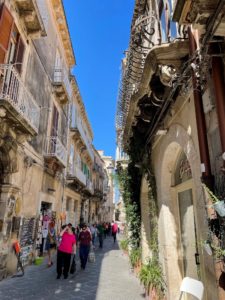
The beautiful streets of Ortigia provided the perfect networking opportunity.
The location of this course – the first in-person since COVID – on the historic island region of Ortigia in the city Syracuse enables course participants, faculty teachers and partner ambassadors alike to wander the streets and keep bumping into one-another. This was networking of the most organic kind.
And what’s more, the distractions of ordinary life were distinctly scarce. All attendees travel to take part in the course, and this coupled with patchy Wi-Fi and a very full itinerary enables participants to become deeply embedded in this experiential learning opportunity.
A spectrum of experience
Interestingly, the course attracts researchers who have had a varied range of experience when it comes to translating their work.
Paul Huang is a Reader and Laboratory Head at the Institute of Cancer Research. “In the past 7 years, I’ve had the opportunity to pursue translational research particularly in the field of soft tissue sarcomas,” he explains. “Through this journey, my education of various aspects of translational research has been self-taught and largely the result of a lot of trial and error. The ICC was a fantastic opportunity to connect and learn from senior professionals in the field across a broad spectrum of topics.”
That sense of solidifying previous experience into a key set of skills is echoed by Tatjana Crnogroac-Jurcevic, Professor and Group Leader at Barts Cancer Centre. “Translational research has been at the core of my research activity for the large part of my scientific career. Like Paul, I have learned how to navigate this field largely through troubleshooting my own mistakes. Learning how to do it ‘the right way’ and sharing this knowledge with younger researchers at my university and wider was my major motivation for attending this course.”
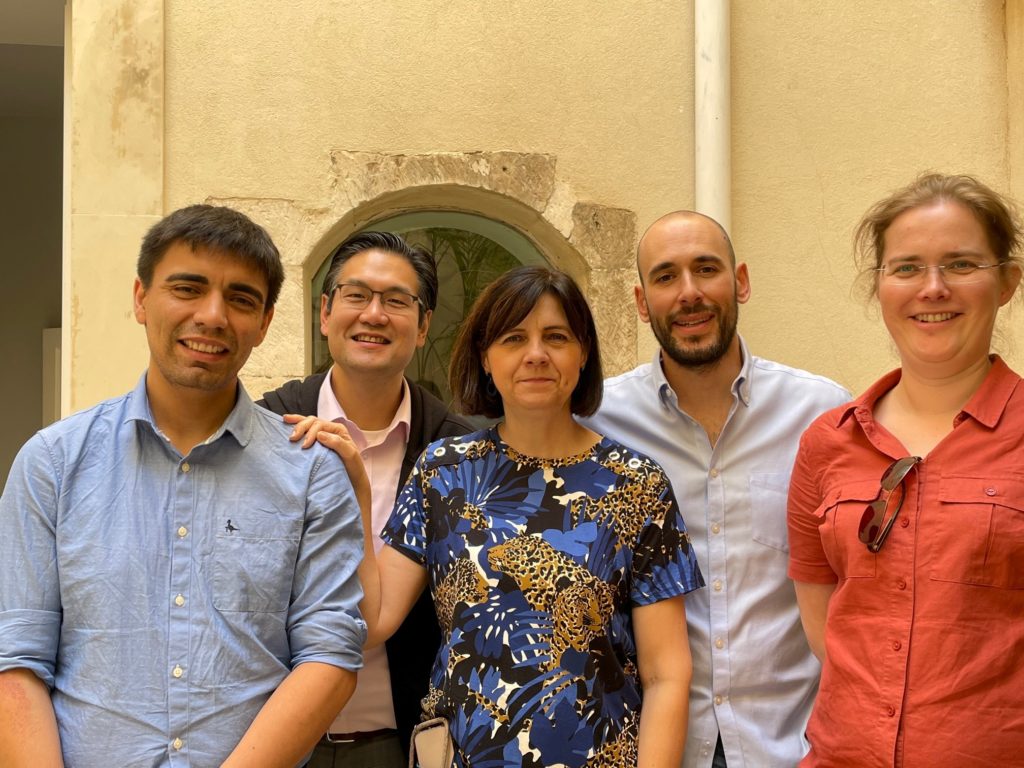
Representing CRUK, (l-r) Felipe Galvez-Cancino, Paul Huang, Tatjana Crnogroac-Jurcevic, Laureano de la Vega and Jacqui Marshall.
And, of course, the experience really does offer great exposure to the translational mind-set for those researchers at an earlier stage of their careers. Felipe Galvez-Cancino is a Postdoc in Sergio Quezada’s lab at UCL. “I am particularly interested in gaining knowledge on how to articulate translational medicine from basic research,” he says. “My research has allowed us to submit two patent applications and we are working, through a partnership with a pharmaceutical company, to validate our targets and develop novel immunotherapies.”
Dear diary…
Following our first night in Syracuse, the course began early on the Sunday morning. A great facet of the course is the sheer variety of places from which attendees were drawn. We met researchers from Utrecht, Rome, UAE, Toronto, Arizona, Drexel, and Duke-Singapore. The faculty for the course included successful academic research translators as well as industry experts.
The main teaching venue was a remarkable space – one of five refurbished rooms in the Borgia del Casale… a palace! Eureka co-founder, Professor Berent Prakken, opened the event by talking through the challenges and skillsets required for success in tanslational medicine. Subsequent sessions covered the crucial role of patients and patient advocates in informing the desired outcomes from translational medicine, and more specifically in the design of
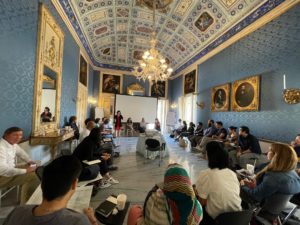
Learning in the fabulous surrounds of the Borgia del Casale.
clinical trials. Something that was particularly noteworthy for Laureano de la Vega, a Senior Lecturer and CRUK Fellow at the University of Dundee. “It was a good way to remind ourselves that all our research should be patient-centred,” he says. “I think the course gave me the opportunity to distance myself from my research for a few days and gave me that necessary time to reflect on my goals and how to achieve them.”
Over the week, we also heard about the business aspects of translation, the regulation processes, and many impressive case studies from academics who had trialled various routes for translation, be that licencing, collaboration or the entrepreneurship needed for the creation of new spin-out companies.
We also had panel sessions and round-table discussions on a range of topics. My part in these was to share insights from the funders’ perspective, and from my own personal development experiences, specifically on collaborative grant funding, on finding a mentor, and on consulting patient groups.
Beyond formal learning
But the course was not all about formal learning. There was a lot of emphasis on the development and practice of relevant skills, such as team building, thinking creatively, and working with different stakeholders. These aspects of the experience added real value, says Tatjana. “Even for the ‘seasoned’ researcher like me, it reminded me of importance of protecting time for thinking and developing ideas, for creating psychologically safe environments for improving creativity and the importance of belonging to a larger translational medicine community.”
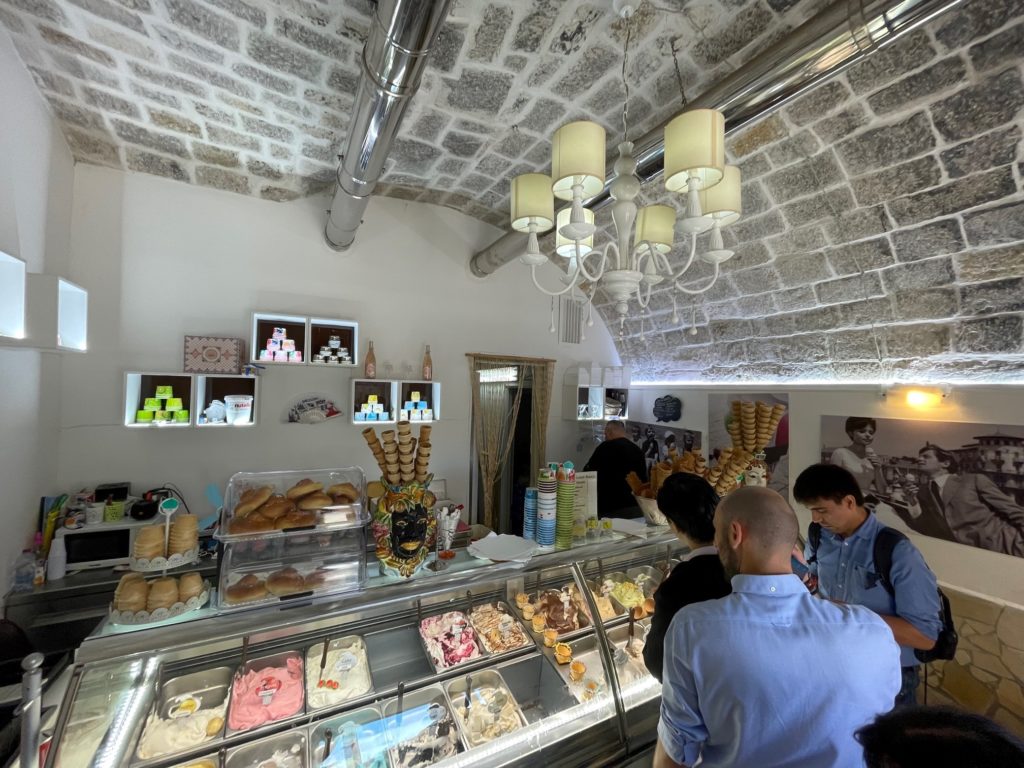
If you want to network, why not d it over gelato? “Happy moments, gelato with the CRUK gang,” Felipe Galvez-Cancino.
There was also an “unfolding case” to explore a translational medicine case-study: a group project work running throughout the week, which culminated in group presentations on the Saturday, our final day in the palace classroom. Mentoring, speed consulting, and evening gatherings really enabled interactions between participants, and the experience gave everyone a list chock-full of useful hints and tips relevant to their own interests and struggles.
“The course, in particular the mentoring aspects with international leaders in translational research, was incredibly helpful both in terms of career development as well as dealing with day-to-day challenges of running a translational lab,” says Paul. “I’ve made friends at this course that I will keep in touch with for the rest of my career!”
“A mixture of good talks, intermixed with fun artistic assignments, and most importantly one-to-one and group mentoring schemes were the highlights for me,” explains Tatjana. “I recommend the course to any researcher keen to translate findings into patient benefit.”
We will soon be open for applications to the October 2023 Eureka ICC course in Sicily, in the first instance to holders of CRUK Fellowship funding. If this, or one of our other training opportunities within the Entrepreneurial Programme, are of interest pleased do subscribe to our newsletter for researchers.
Explore Cancer Research Horizons
You may also be interested in offerings from our other training partnerships, such as our partnership with Start Codon, or, if you have an idea for a potential new spin-out company, you may wish to consider applying for one of the spots we sponsor on various early-stage accelerator schemes.
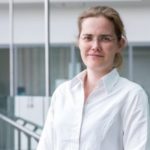 Author
Author
Dr Jacqui Marshall is Research Programme Manager for discovery research & research careers at Cancer Research UK
Tags
There are no tags
